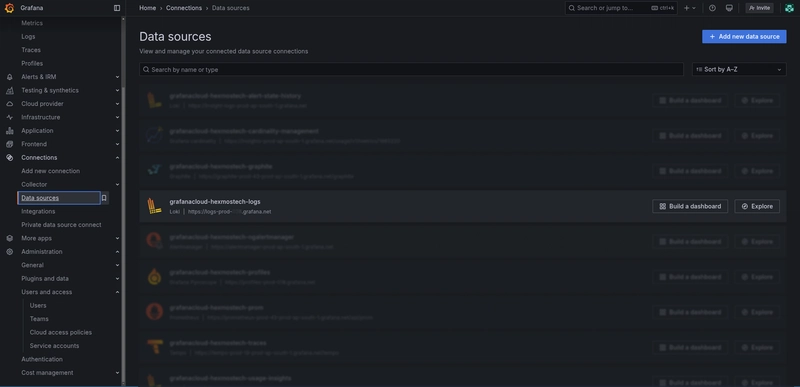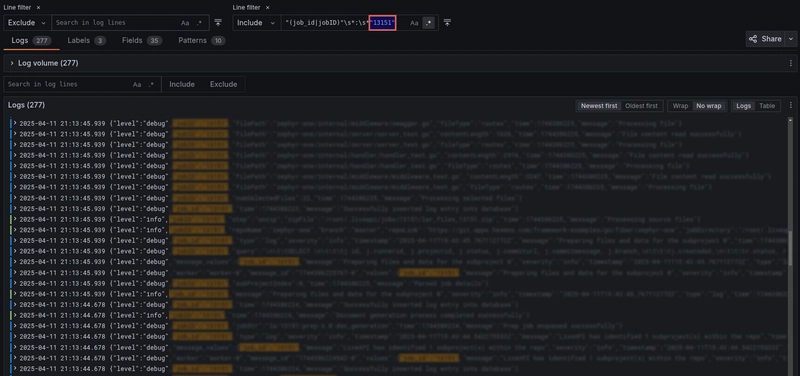Hello, I'm Maneshwar. I'm working on FreeDevTools online currently building **one place for all dev tools, cheat codes, and TLDRs* — a free, open-source hub where developers can quickly find and use tools without any hassle of searching all over the internet.
Setting up logging inside containers can be annoying — especially when logs vanish with the container or you have to mess with volume mounts just to see what's going on.
Here's how I made it super simple using Grafana Alloy to send logs from a Flask server running inside a Docker container to Grafana Cloud, without touching host volumes.
Quick Demo App: Flask Logger
Let's start w
ith a super basic Flask app that just logs requests:
# app.py
from flask import Flask
import logging
app = Flask(__name__)
logging.basicConfig(filename="liveapi.log", level=logging.INFO)
@app.route("/")
def hello():
app.logger.info("GET / was hit")
return "Hello, World!"
if __name__ == "__main__":
app.run(host="0.0.0.0", port=5000)
This will create a liveapi.log file in the current working directory.
☁️ Set Up Grafana Cloud + Loki
- Go to Grafana Cloud.
- Sign up or log in.
- In the sidebar, go to Connections → Data sources.
- Search for Loki and set it up.
- Copy the Loki Push URL from the connection config. It'll look like:
https://<username>:<api-key>@logs-prod-000.grafana.net/api/prom/push
You'll use this in Alloy later.
🐳 Dockerfile: Flask + Alloy Without Volume Mounts
Here's the Dockerfile that installs everything, writes logs, and sends them to Grafana Loki using Alloy:
FROM debian:bookworm-slim
RUN apt-get update && apt-get install -y \
python3 python3-pip gpg wget curl gnupg ca-certificates systemctl \
&& rm -rf /var/lib/apt/lists/*
WORKDIR /app
COPY requirements.txt .
RUN pip3 install --no-cache-dir --break-system-packages -r requirements.txt
# Install Alloy
RUN mkdir -p /etc/apt/keyrings/ && \
wget -q -O - https://apt.grafana.com/gpg.key | gpg --dearmor | tee /etc/apt/keyrings/grafana.gpg > /dev/null && \
echo "deb [signed-by=/etc/apt/keyrings/grafana.gpg] https://apt.grafana.com stable main" > /etc/apt/sources.list.d/grafana.list && \
apt-get update && apt-get install -y alloy && \
rm -rf /var/lib/apt/lists/*
COPY . .
RUN mkdir -p /etc/alloy/ && cp config.alloy /etc/alloy/config.alloy
EXPOSE 5000
CMD systemctl restart alloy && python3 app.py
No volume mounts. No host bind paths. Everything is self-contained inside the container.
⚙️ config.alloy (Log Pipeline for Alloy)
Create config.alloy in your repo:
local.file_match "local_files" {
path_targets = [{ "__path__" = "/app/liveapi.log" }]
sync_period = "5s"
}
loki.source.file "log_scrape" {
targets = local.file_match.local_files.targets
forward_to = [loki.process.filter_logs.receiver]
tail_from_end = true
}
loki.process "filter_logs" {
forward_to = [loki.write.grafana_loki.receiver]
stage.static_labels {
values = {
job = "liveapi"
service_name = "liveapi"
}
}
}
loki.write "grafana_loki" {
endpoint {
url = "https://<your-username>:<your-api-key>@logs-prod-000.grafana.net/api/prom/push"
}
}
Change the endpoint to match your Grafana Loki Push URL.
Build & Run
Build the Docker image:
docker build -t flask-alloy .
Run it:
docker run -p 5000:5000 flask-alloy
Now visit http://localhost:5000 to trigger logs. Check Grafana Cloud’s Explore tab and query:
{job="liveapi"}
Boom — your logs are in the cloud. 🎉
Any Better Way?
Let me know in the comments — is there a simpler or cooler way you’re pushing logs to Grafana Loki from containers? Would love to steal it.
I’ve been building FreeDevTools.
A collection of UI/UX-focused tools crafted to simplify workflows, save time, and reduce friction in searching tools/materials.
Any feedback or contributors are welcome!
It’s online, open-source, and ready for anyone to use.
👉 Check it out: FreeDevTools
⭐ Star it on GitHub: freedevtools
Let’s make it even better together.







Top comments (2)
Amazing guide, and it's super simple to follow!
Thanks @nevodavid :)